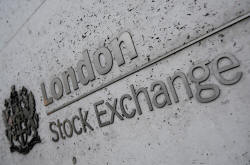Energy, bank shares lead charge as oil hits 3-yr high
 Send a link to a friend
Send a link to a friend
 [September 27, 2021] By
Sujata Rao [September 27, 2021] By
Sujata Rao
LONDON (Reuters) - Global energy shares led
equity gains on Monday as crude oil prices hit three-year highs of
almost $80 a barrel, while U.S government borrowing costs advanced for a
sixth week on bets that higher interest rates were on the way.
Stocks also benefited from an easing in Sino-U.S. tensions and Chinese
authorities' decision to pump in more cash to offset the fallout from
real estate firm Evergrande's woes, while there was some relief
Germany's election outcome had ruled out a pure left-wing coalition
government.
Instead, a coalition of the centre-left Social Democrats with the Greens
and the liberal FDP looks likely
While early German equity gains fizzled, European energy and banking
shares surged around 2.5% benefiting from the jump in crude prices and
bond yields respectively, with the former at the highest since February
2020.

The oil price surge is stoking speculation that global inflation will
prove longer-lasting than anticipated, forcing central banks to act and
benefiting so-called reflation investments which benefit as rates rise.
On Wall Street, the industrials-heavy Dow Jones appeared set for a firm
session, while futures for the tech-dominated Nasdaq, which do less well
when rates rise, were down 0.3%.
"All in all, it's a positive story as we have a strong economic macro
story underpinning everything," said Fahad Kamal, CIO at Kleinwort
Hambros in London.
Kamal noted that optimism was reflected in central banks signalling
their intent to gradually remove pandemic-era stimulus, which in turn
was lifting bond yields.
"There is still a huge factor of TINA and it's even stronger when rates
are rising...It's not just energy but also bank shares doing really well
given the rising rate expectations," he said, using the 'there is no
alternative' (TINA) acronym often employed by equity bulls.
Oil futures have climbed around $9 a barrel over September. Brent crude
traded on Monday at $79.25 a barrel, while U.S. crude rose 97 cents to
$74.95. [O/R]
Coming on top of this year's 300% surge in European gas prices, the
price rises risk further inflaming inflation expectations and hastening
the end of super-cheap money,
Goldman Sachs forecast Brent to hit $90 per barrel by year-end, adding
"the current global oil supply-demand deficit is larger than we
expected, with the recovery in global demand from the Delta impact even
faster than our above-consensus forecast".
[to top of second column] |

The London Stock Exchange Group offices are seen in the City of
London, Britain, December 29, 2017. REUTERS/Toby Melville

Investors are therefore repositioning portfolios; U.S. 10-year Treasury bond
yields, a key determinant of global capital costs, jumped 9 basis points last
week while industrials-heavy U.S. Dow Jones index outperformed the Nasdaq index
of tech stocks.
On Monday, U.S 10-year Treasury yields rose to 1.49%, their highest since
end-June, while German 10-year government borrowing costs overcame an early dip
to hit a three-month high of -0.210,
The stronger rise in U.S. yields, especially on an inflation-adjusted basis, is
also lifting the dollar which rose 0.15% against a basket of major currencies,
inching towards the one-month high hit last week.
Worries persist about China, however.
A power supply crunch that is triggering an industrial contraction and
pressuring the economic outlook is adding to concerns stemming from property
firm Evergrande which missed a bond coupon payment last week and faces another
in coming days.
Hong Kong-listed shares in Evergrande's electric car unit plunged as much as 26%
after it warned it urgently needed a swift injection of cash.
Still, Chinese blue chip shares gained 0.5%, thanks to another cash injection
from the central bank and hopes the release of Huawei executive Meng Wanzhou
would reset ties with the West.
"The energy shortages are coming on top of Evergrande and the regulatory
crackdown. These things are unrelated but happening in quick succession could
lead to something more serious," Kamal said.

Focus shifts now to U.S. fiscal policy -- the House of Representatives is due to
vote on a $1 trillion infrastructure bill, while a Sept. 30 deadline on funding
federal agencies could force the second partial government shutdown in three
years.
(Reporting by Sujata Rao; Additional reporting by Wayne Cole in Sydney)
[© 2021 Thomson Reuters. All rights
reserved.] Copyright 2021 Reuters. All rights reserved. This material may not be published,
broadcast, rewritten or redistributed.
Thompson Reuters is solely responsible for this content. |